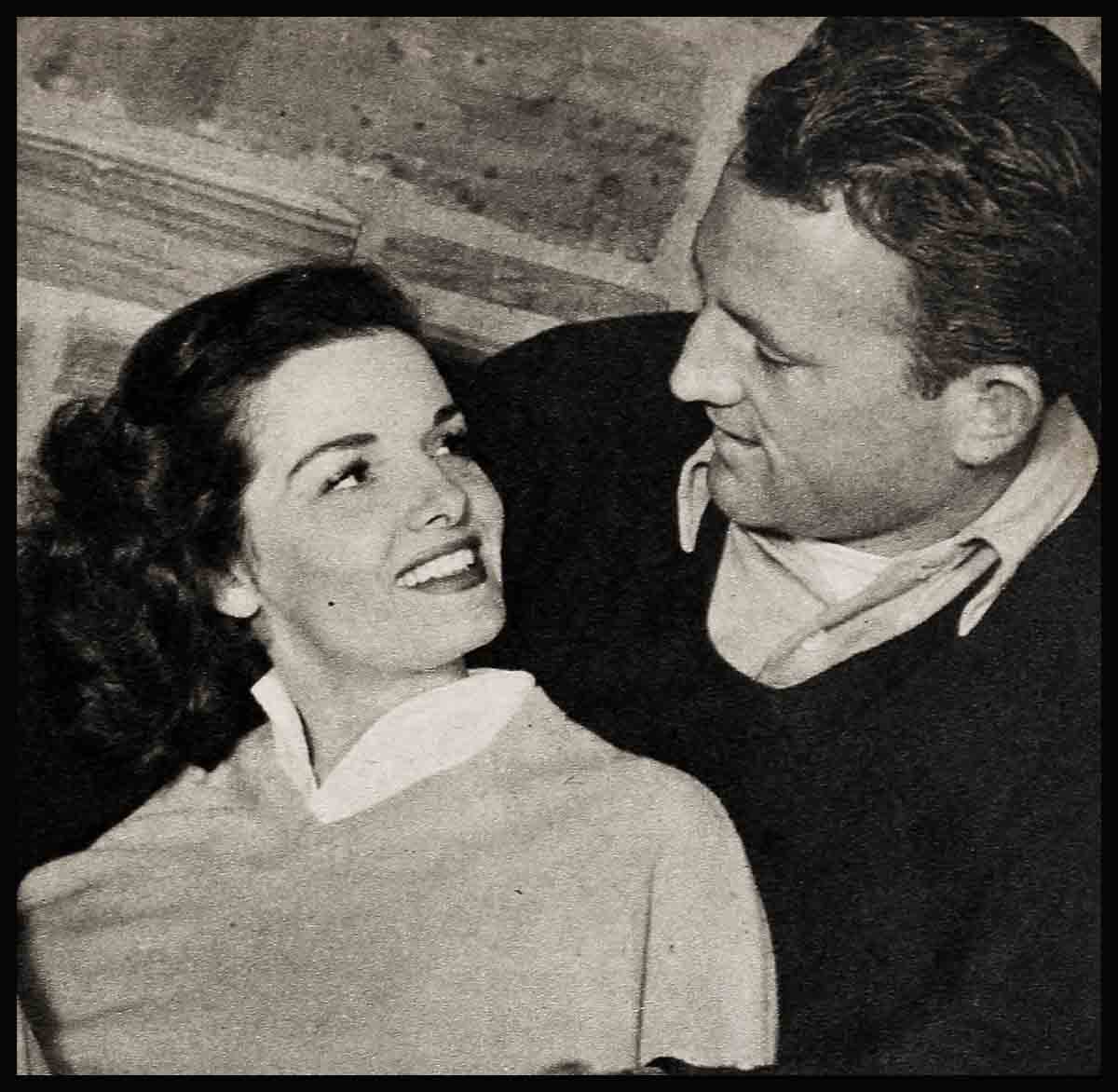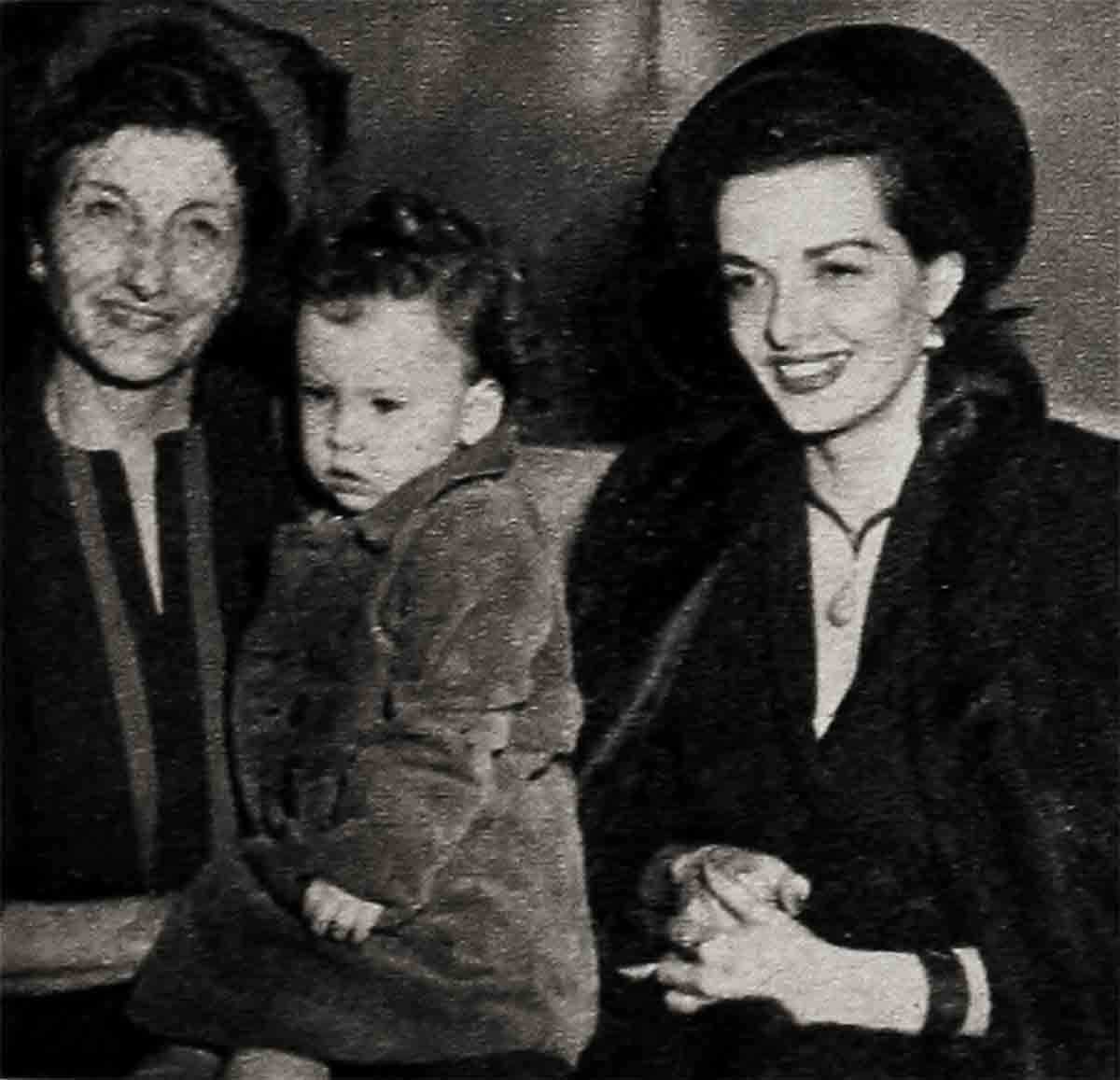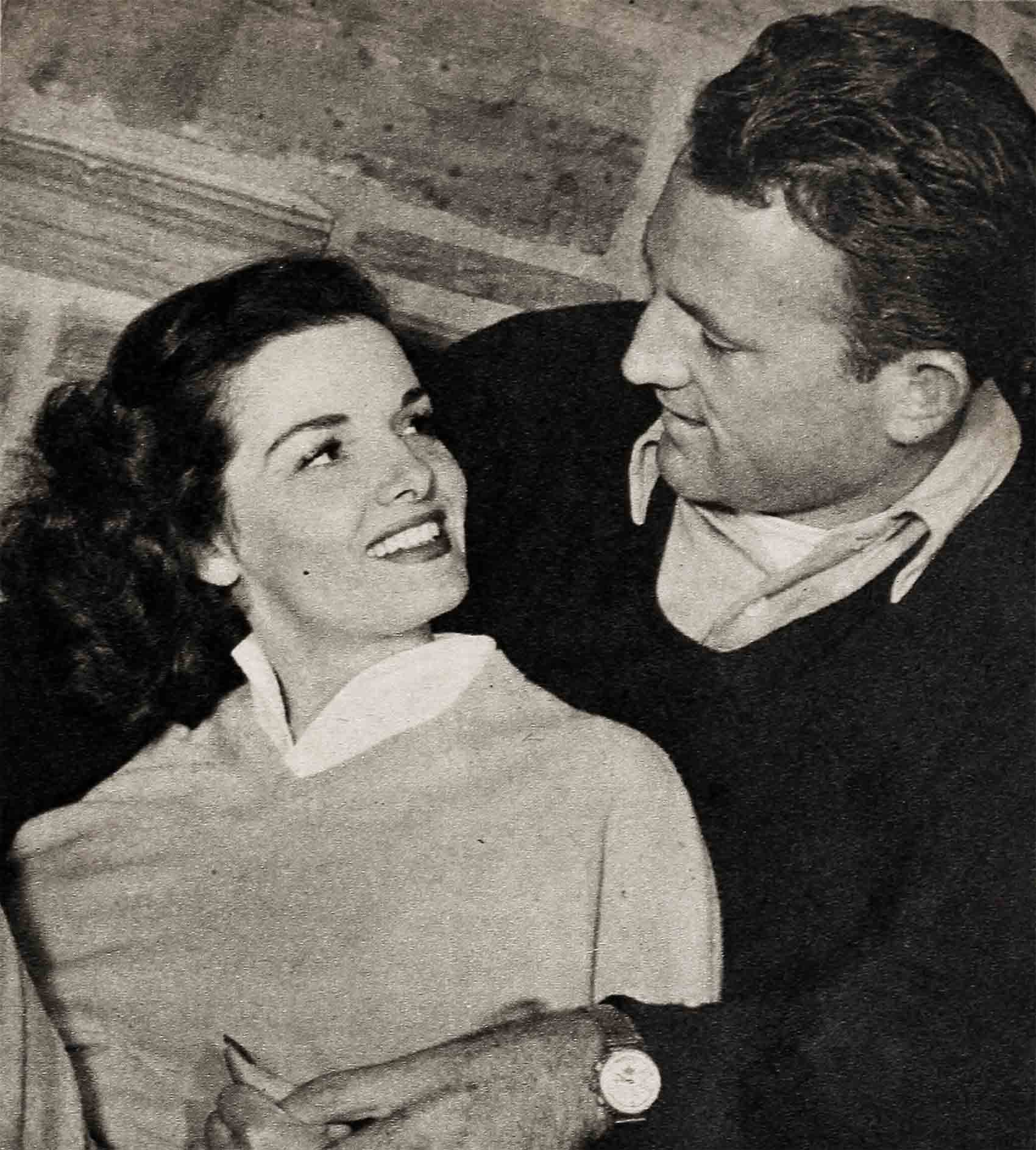
A Life Of Her Own—Jane Russell
Her mother says simply, “I lost the reins.”
Jane says, “I just had to go through all that. I’m not sure why . . . but I had to learn for myself.”
These are the words with which they recall the time in Jane Russell’s life two years before Hollywood discovered her when her teen-age idealism mixed oddly with the world as she found it . . . and she rebelled. For three months she stayed away from home, living with a girl friend, and trying to find herself. This was a period when her whole character was to be tested and her whole life shaped into its final mold. This was to be the emotional crisis of her youth . . .
Perhaps it all began during her last year of high school when the gang she traveled with became enamored of the free-spirited poets and writers, of Edna St. Vincent Millay, of Shelley and Byron and Thomas Wolfe . . .
“We used to gather at one girl’s house, a girl whose dad worked nights, and drink burgundy while we read or listened to records,” Jane has recalled. “Everything was quite arty but there didn’t seem to be any pretence at highbrowism. Some of the kids came out with rather good things of their own; as for me, I painted or listened. These little sessions sometimes lasted until three in the morning and Mom used to get a little unhappy with her eldest daughter.”
There were other things that made “Mom” unhappy with her eldest and only daughter. A couple of years before, when Jane was just a skinny, bossy sophomore et Van Nuys High School there was a football hero senior who used to have a curious effect on her. Every time he came near her, as she has said, “. . . the hair on the back of my head would stand up straight and I’d spit some endearing thing at him like, ‘Oh, yeah?’ ”
Bob Waterfield went on to U.C.L.A. to play on the varsity team and Jane became a senior herself at Van Nuys at which time she wasn’t so spindly any more. Her bathing suit felt right at home on her and ‘Bob apparently decided that her sharp manner was perhaps just a cover-up for an eager heart. He came over to her on the beach, that first time, and was so nice to her that she was thrown completely off her guard. Before she knew it she wasn’t nipping at him any more! That night she sneaked out of her home for the first time in her life. She and Bob had made a date to meet on the beach again. She wrote her mother a note and said that “the guy way back in my diary” had asked her to go out and that school night or no school night she just had to go.
But there were church nights, too, which he was to cause her to pass up. These were the Sunday evenings when Jane her four younger brothers would go to a little church in Sherman Oaks. Bob, now dating her every night he could get away, would know where they were and drive up outside, purposely racing the motor of his cutdown roadster. With each acceleration the deep, unmuffled bark of the exhaust would carry to the ears of the congregation inside, particularly to Jane. Her dark head would drop and she would shift about in her seat uneasily. Her brothers would grin maliciously, and her mother would sit up, disapprovingly rigid.

Sometimes Jane would try to resist temptation, but there were other times, too, times when she had been arguing with her mother about life and about God, and was in a resentful mood. One night, as she heard Bob outside, she turned to her mother and asked, “How long must I continue this farce?”
Her mother, instinctively knowing that she was contending with a spirit as strong as her own, and indeed derived from herself, looked straight ahead as she answered, “You don’t have to continue it. I will never ask you to come to church again if you. think it is a farce.”
Jane sat in silence for a few minutes. Then she got up and walked swiftly to the door. The minister was still talking as she disappeared outside. A moment later, a last spurt of noise came from the car, a thunderous blast that seemed to symbolize the defiance of youth as Jane and Bob sped away . . .
Sped away where? Jane didn’t know. She was always speeding away from the “as is” to the “as should be.” She was always being pushed by motivations she couldn’t understand . . . to break loose from traces that seemed to chafe and bind.
“I don’t remember just how,” she has said, “but around this time, with the arts and the different viewpoints I came across, atheism crept in. I guess I figured that all the people we were reading, who had gained world-wide recognition, just couldn’t be wrong, and that Mom was a little old-fashioned and that the thought of God and Jesus comforted her. But if a person were to be really honest with herself and face facts, she’d plainly see that she could shape her life the way she wanted to. Just be honest . . . that’s all.”
It wasn’t then that she left her home, however. She was still seeking another way. After her graduation she went to visit her grandfather on a lake in the Canadian Rockies. Every afternoon she would row to the middle of the lake and sit there for hours, content just to be there. But her grandfather couldn’t understand it. He wanted to take her sightseeing and fishing. Once he told her that he was a little worried about her lack of interest in her future. She could think of no future—except that she must make one for herself, and that before she could begin she must not be treated as a child. She returned to the San Fernando Valley and she talked to her mother.
“We are not a mother and her little girl anymore,” she said. “I am a person and you are a person. I must be recognized as such.”

Behind these words were many things. She felt restraint, she felt the weight of parental pressure at a time when she herself could not tell which way to turn and wished only to wait and see.
Her mother had repeatedly said that after her children finished high school, the boys were to go to college and Jane to a fishing school. Jane had never had sensational report cards, “except, maybe, that they were sensationally bad.” She could always get A’s in art, music, and drama, but English was one great big blur. Chemistry, the boys in the class did for her; when she finally passed this subject it was because she faithfully promised never to take it again. Mathematics was just an added hour of drawing as far as she was concerned. She didn’t want to go to any finishing school.
And it was that she was not yet grown up enough to run her own life . . . that Jane left her home.
Her mother knew where she was, yet made no effort to bring her back. Not directly. But she recalls that she prayed like this: “Lord, listen to me. You have been a husband to the husbandless and a father to the fatherless. See over this child, that the harum-scarum not use her for their glory.”
With patience she waited for Jane to return. “I was certain she would,” she says. “She was not a sinner. She was a girl with strong convictions. She felt she must save herself as an individual even at the risk of losing herself as one of the family.”
And those who knew Jane then found it difficult to condemn her for anything but humanness—the kind of human Jane Russell happened to be. And today, hiding nothing about herself, she will tell you she stands before her God, not as an innocent but as a true penitent.
Jane racked her brain with questions while she was away from home. She wrote her thoughts down. “Why was I born?” she wrote. “Was it an accident? What is my purpose or obligation to life . . . to be a good kid and help the world be a better place to live?”
She would balance a joyful event in her own life against a tragic event in the life of someone else. She would think of how she felt in Canada when at last she made up her mind to return home and knew that Bob would be waiting for her. She wasn’t allowing herself to think of marriage, yet she wrote then: “The quarterback looked mighty good to me and he even threw his arms around me right on the platform so I knew he was glad to see me, too.”
The same girl would also write to herself, “The suffering in India and China makes me want to weep. Ignore it? Enjoy life? Live it to the hilt? Make things happy for the good by being strong-minded and optimistic? Maybe, but I’d get awfully tired trying and I’d have to wear blinders and never look to the right or left—never look at the guy selling pencils. And then what? Then you die—they dig a hole for you and time marches on. No thanks. That thought alone depresses me so much they can dig the hole right now.”
Even at the age of 18, she was deeply concerned about all of life. She didn’t give voice to it aloud because she hated, more than anything else, the curse of affection. She is uncomfortable today with people who are professionally religious in their attitude. Not long ago she went to an army hospital with a group of church workers who were insistently pious, even to the way they sat, or talked, or held their hands in folded piety. She was so uncomfortable that she notified the leader of the delegation that she simply could not go with them again. At the hospital, as a matter of fact, she spent most of her time in the company of a rough-talking soldier who was emphatic in his rejection of their message of salvation. He offended the other members of the delegation, but Jane thought he was exactly the man they should persevere with. Before the session was over she and the soldier had gone deeply into religion, and if his redemption was not obtained at least his interest in her words was sincere.
This was the sort of girl who had struck out for herself, and these were the thoughts that were crowding her mind. It isn’t any wonder that she descended into sickness, both physical and mental. In addition to the worries of the future which surged through her mind, there was the pull of the ties she had broken—her brothers, her mother—and the memory of her father.
She would think of her brothers in a motherly way—the intense yet shy Tom, Kennie so bold and optimistic, Jamie always abrupt but impulsively affectionate as well, and Wally who was even then showing signs of the sophisticated air which was to come to him later. She thought of them mother-wise because she had been in charge of them for so long—all through the illness which weakened her father. And no family was ever closer than they were when, just a few days after a “successful” operation, her father suddenly died. Everyone but her mother had gone to pieces. All the things which had to be attended to, her mother handled. Never did anyone ever see her cry—not until a Sunday morning sometime afterwards when they all went to church and the choir sang a beautiful hymn. The congregation was standing, and her mother just crumpled to her seat and buried her face in her hands. The music now became a background for her sobbing. Yet there was nothing to do but wait. And when she finally stopped and got up, she looked, Jane remembered, as if she had had a good cry on somebody’s shoulder. Jane thought she had.
Jane’s illness marked the end of her “runaway.” She returned home and was not only welcomed, but, as she will always recall gratefully, she was welcomed without any fuss. And it was there, lying in bed at home, looking out at her mother’s beautiful garden and up at her towering Eucalyptus trees, that Jane found the Someone she had to find before she could find herself.
She was no longer unsure. When less than two years later, in 1941, her career as an actress began she was ready for it, and as a person who moved with sure footing. Not long after this when Bob enlisted she sensed immediately what her role should be in real life. They were married, and though she was beginning to be a name in Hollywood she was even happier to ask for leave from the studio and become just another one of the nation’s thousands of army wives.
This was the strength of self and of self-knowledge she got from that Someone she found—about whom she has written: “There was no chance of mistaken identification. He . . . was God.”
THE END
—BY STEVE CRONIN
(Jane Russell can be seen in RKO’s Macao—The Ed.)
It is a quote. MODERN SCREEN MAGAZINE MARCH 1952




